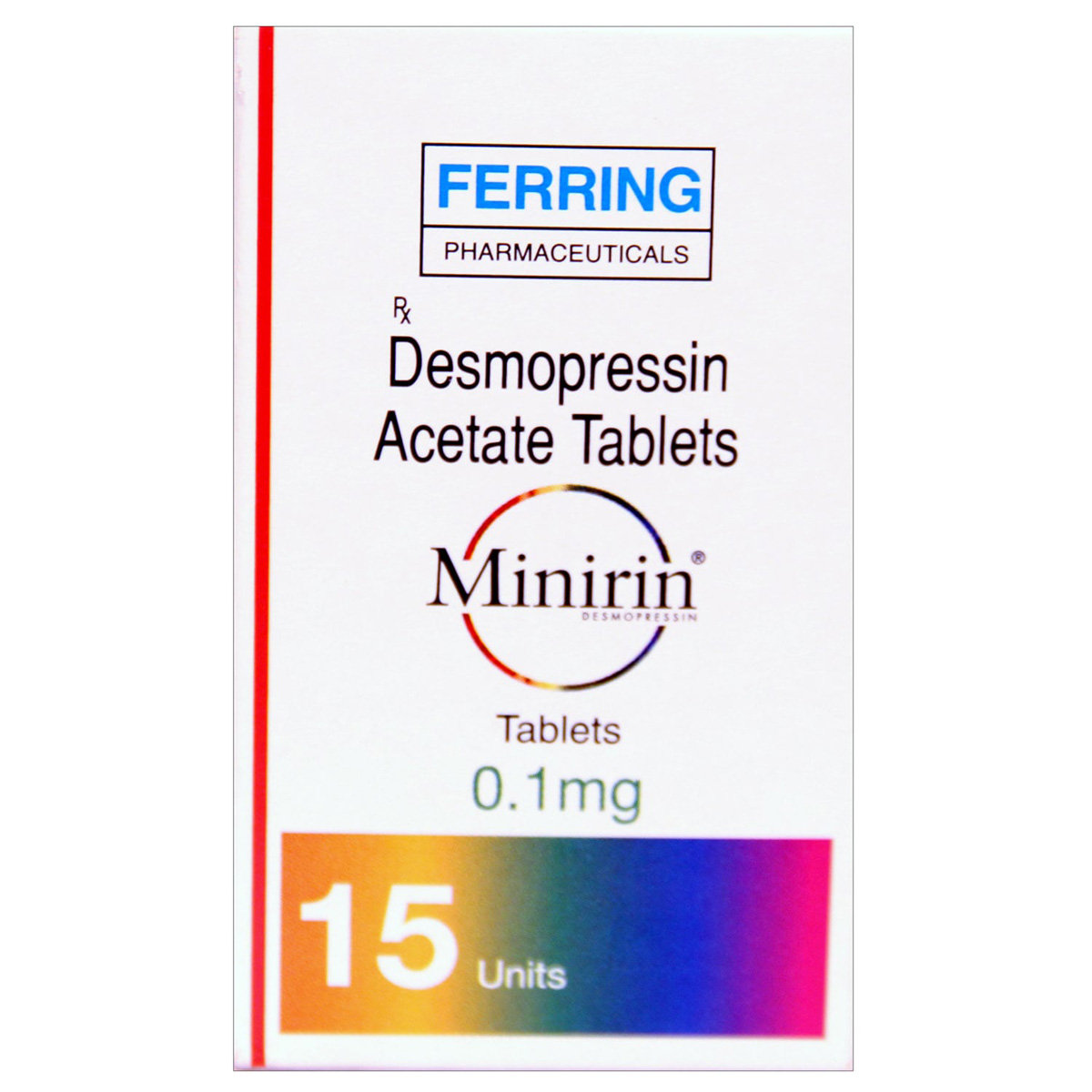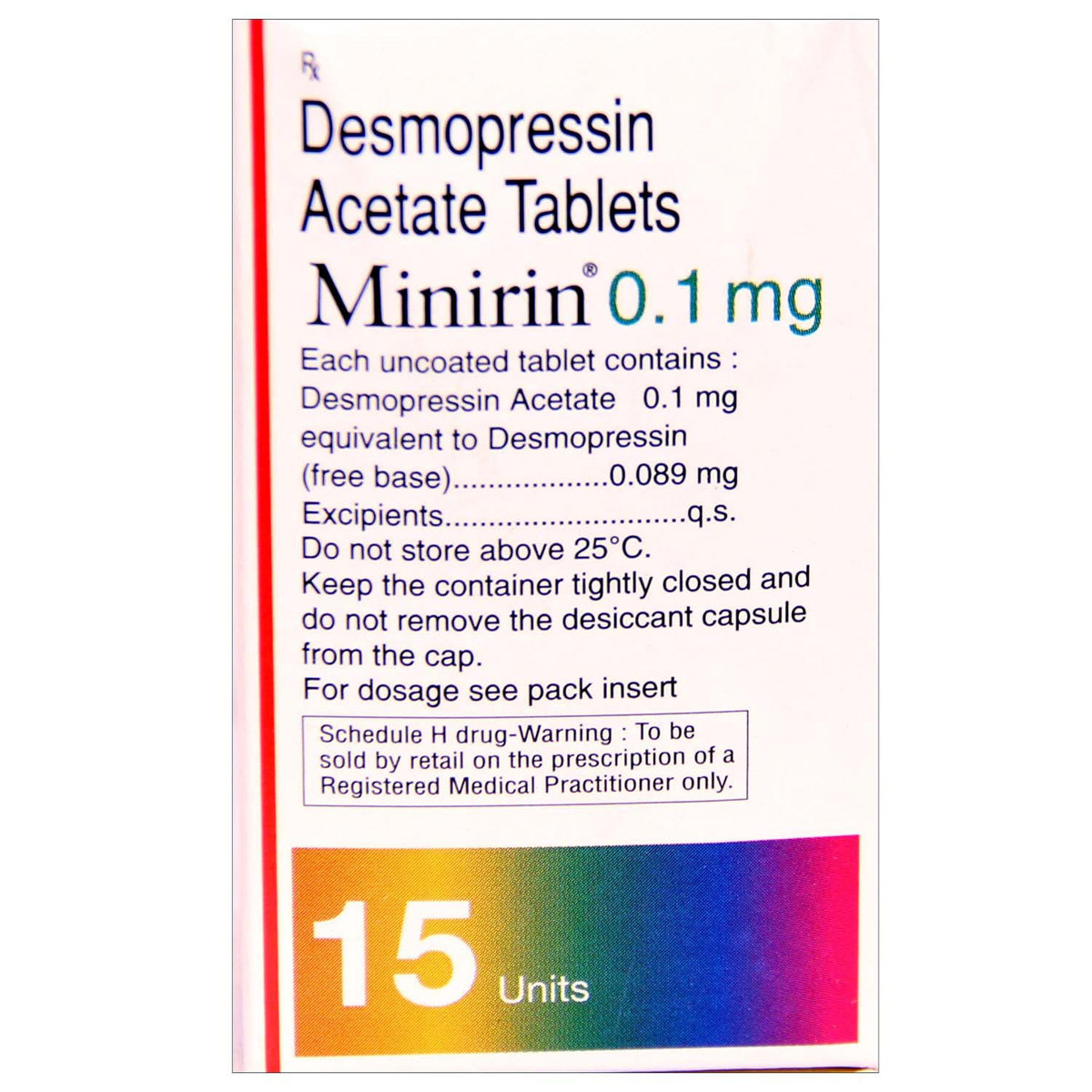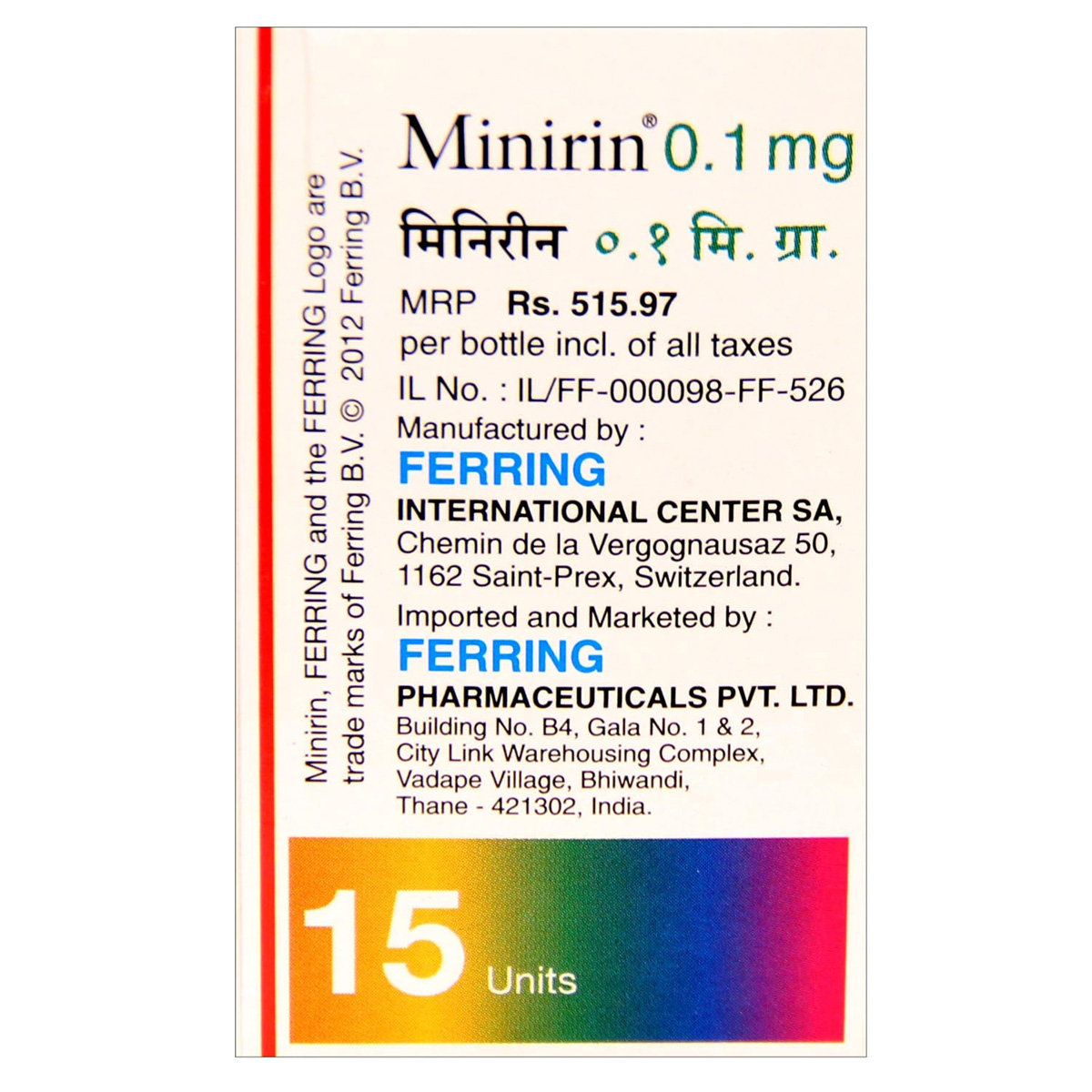Minirin 0.1 Tablet 15's
MRP ₹533
(Inclusive of all Taxes)
₹64.0 Cashback (12%)
Provide Delivery Location
Online payment accepted
 Prescription drug
Prescription drugWhats That
Composition :
Manufacturer/Marketer :
Consume Type :
Expires on or after :
Return Policy :
About Minirin 0.1 Tablet
Minirin 0.1 Tablet is a hormone analogue that belongs to the class of ‘antihemophilic agents’ primarily used to treat diabetes insipidus, post-hypophysectomy polyuria (extreme urination) polydipsia (extreme thirst), and bedwetting. Diabetes insipidus is a condition in which the body fails to control water balance, resulting in excessive urination. Hypophysectomy is the surgical removal of the hypophysis (pituitary gland).
Minirin 0.1 Tablet contains Desmopressin, a human-made form (synthetic) of Vasopressin. Vasopressin is an antidiuretic (that controls fluid balance) hormone, synthesized in the pituitary gland's hypothalamus. When your body cannot produce enough vasopressin, Minirin 0.1 Tablet is given to replace a low vasopressin level. It mimics the natural hormone, vasopressin and works by reabsorbing water from the kidneys, which controls excessive thirst and urination in diabetes insipidus. It also decreases the amount of urine produced and controls bedwetting in children. Being an anti-haemophilic agent, Minirin 0.1 Tablet also reduces bleeding tendency in haemophilia (bleeding disorder) by promoting the release of blood clotting factors.
Your doctor will decide the dosage depending on your medical condition. The common side effects of Minirin 0.1 Tablet include headache, nausea, abdominal cramp, flushing (sense of warmth in the face, ears, neck, and trunk). Although not everyone experiences these side effects, if they occur, seek medical attention.
Before starting Minirin 0.1 Tablet , let your doctor know if you have any medical history of severe kidney disease or hyponatremia (low sodium levels in your body), extreme thirst, uncontrolled high blood pressure, heart failure, and fluid retention. While using Minirin 0.1 Tablet , limit water and other fluids' intake since it may lead to electrolyte imbalance. Avoid drinking coffee, tea, cola, energy drinks, or other caffeine sources before bedtime, leading to increased urination. Pregnant and breastfeeding women should consult their doctor before using Minirin 0.1 Tablet . Do not take or stop this medicine, if the doctor did not advise you to do so.
Uses of Minirin 0.1 Tablet
Directions for Use
Key Benefits
Minirin 0.1 Tablet is a hormone analogue that treats diabetes insipidus, post-hypophysectomy polyuria (extreme urination) or polydipsia (excessive thirst), and bedwetting. It contains Desmopressin, a synthetic form of Vasopressin (antidiuretic hormone), which mimics the natural hormone, vasopressin and works by limiting the amount of water eliminated in the urine, thus controlling excessive thirst and urination in diabetes insipidus. It also decreases the amount of urine produced, thereby preventing the urinary bladder from filling up at night time and controls bedwetting in children. Being an anti-haemophilic agent, Minirin 0.1 Tablet also reduces bleeding tendency in haemophilia (bleeding disorder) by promoting the release of blood clotting factors.
Storage
- Hydrate your body: Drink enough water to prevent dehydration and headaches.
- Calm Your Mind: Deep breathing and meditation can help you relax and relieve stress.
- Rest and Recharge: Sleep for 7-8 hours to reduce headache triggers.
- Take rest: lie down in a quiet, dark environment.
- Cold or warm compresses can help reduce tension.
- Stay Upright: Maintain good posture to keep symptoms from getting worse.
- To treat headaches naturally, try acupuncture or massage therapy.
- Over-the-counter pain relievers include acetaminophen and ibuprofen.
- Prescription Assistance: Speak with your doctor about more substantial drug alternatives.
- Severe Headaches: Seek emergency medical assistance for sudden, severe headaches.
- Frequent Headaches: If you get reoccurring headaches, consult your doctor.
- Headaches with Symptoms: Seek medical attention if your headaches include fever, disorientation, or weakness.
- Consume controlled amounts of salt to raise sodium levels.
- Eat fresh fruits like apples, berries, oranges, mangoes, and bananas.
- Include fresh vegetables like broccoli, sweet potatoes, beets, okra, spinach, peppers, carrots, and edamame.
- Choose frozen vegetables without added butter or sauce.
- Drink electrolyte beverages like sports drinks or electrolyte solutions to replenish sodium and other electrolytes.
- Avoid excessive salt intake, but allow for controlled increases as needed.
- Monitor and manage underlying health conditions that may contribute to hyponatremia.
- Inform your doctor about dizziness symptoms. They may adjust your medication regimen or prescribe additional medications to manage symptoms.
- Follow your doctor's instructions for taking medication, and take it at the same time every day to minimize dizziness.
- When standing up, do so slowly and carefully to avoid sudden dizziness.
- Avoid making sudden movements, such as turning or bending quickly, which can exacerbate dizziness.
- Drink plenty of water throughout the day to stay hydrated and help alleviate dizziness symptoms.
- If you're feeling dizzy, sit or lie down and rest until the dizziness passes.
- Track when dizziness occurs and any factors that may trigger it, and share this information with your doctor to help manage symptoms.
- If you experience nosebleeds or unusual bleeding after taking medication, seek medical attention right away and schedule an appointment to discuss your symptoms with your doctor.
- Your doctor may adjust your treatment plan by changing the dosage, switching to a different medication, or stopping the medication.
- If your doctor advises, take steps to manage bleeding and promote healing, such as applying pressure, using saline nasal sprays, or applying a cold compress, using humidifiers, avoiding blowing or picking your nose, and applying petroleum jelly to the nostrils.
- Schedule follow-up appointments with your doctor to monitor progress, adjust treatment plans, and prevent future episodes.
Drug Warnings
Before starting Minirin 0.1 Tablet , let your doctor know if you have any medical history of severe kidney disease, hyponatremia (low sodium levels in your body), extreme thirst, uncontrolled high blood pressure, heart failure, fluid/mineral imbalance (cystic fibrosis), bleeding/clotting problems, and fluid retention. While using Minirin 0.1 Tablet , limit water and other fluids' intake since it may lead to electrolyte imbalance. Inform your doctor if you have any allergic reactions or lactose intolerance before using Minirin 0.1 Tablet . Please consult your doctor before starting Minirin 0.1 Tablet if you are pregnant, planning to conceive or are a breastfeeding mother. It is not recommended to consume alcohol since it may worsen the side effects and increase urination.
Drug-Drug Interactions
Drug-Drug Interactions
Login/Sign Up
Co-administration of Minirin 0.1 Tablet together with triamcinolone may increase the risk of hyponatremia (a condition associated with low levels of salt in the blood).
How to manage the interaction:
Taking Triamcinolone with Minirin 0.1 Tablet is not recommended, but it should be taken if advised by a doctor. However, if you experience nausea, vomiting, headache, tiredness, irritability, difficulty concentrating, confusion, muscle spasm, weakness, , decreased urination and loss of appetite(less desire to eat), contact your doctor immediately. Do not discontinue any medications without consulting a doctor.
Co-administration of Bumetanide and Minirin 0.1 Tablet may increase the risk of hyponatremia (low levels of salt in the blood).
How to manage the interaction:
If you have to use Minirin 0.1 Tablet and Ciclesonide together, a doctor may adjust the dose or monitor you more frequently to safely use both medications. However, if you experience loss of appetite, headache, nausea, vomiting, lethargy (very tired), irritability, difficulty concentrating, weakness, unsteadiness, memory impairment, confusion, muscle spasm, decreased urination, and/or sudden weight gain, contact your doctor immediately as these may be symptoms of water intoxication (water poisoning) and hyponatremia (low levels of salt in the blood). Do not discontinue the medication without consulting a doctor.
Co-administration of Torasemide can make Minirin 0.1 Tablet may increase the risk of hyponatremia (low levels of salt in the blood).
How to manage the interaction:
If you have to use Minirin 0.1 Tablet and Torasemide together, a doctor may adjust the dose or monitor you more frequently to safely use both medications. However, if you experience loss of appetite, headache, nausea, vomiting, lethargy (very tired), irritability, difficulty concentrating, weakness, unsteadiness, memory impairment, confusion, muscle spasm, decreased urination, and/or sudden weight gain, contact your doctor immediately as these may be symptoms of water intoxication (water poisoning) and hyponatremia (low levels of salt in the blood). Do not discontinue the medication without consulting a doctor.
Using Minirin 0.1 Tablet together with fludrocortisone may increase the risk of hyponatremia( a condition associated with low levels of salt in the blood).
How to manage the interaction:
Taking Minirin 0.1 Tablet with Fludrocortisone is not recommended, but it can be taken if prescribed by a doctor. However, if you experience loss of appetite, nausea, vomiting, headache, lethargy, irritability, difficulty concentrating, memory impairment, confusion, muscle spasm, weakness, unsteadiness, decreased urination and sudden weight gain contact your doctor immediately. Do not discontinue any medications without consulting a doctor.
Coadministration of Prednisone and Minirin 0.1 Tablet may increase the risk of hyponatremia (low levels of salt in the blood).
How to manage the interaction:
If you have to use Minirin 0.1 Tablet and prednisone together, your doctor may adjust the dose or monitor you more frequently to safely use both medications. However, if you experience loss of appetite, headache, nausea, vomiting, lethargy (very tired), irritability, difficulty concentrating, weakness, unsteadiness, memory impairment, confusion, muscle spasm, decreased urination, and/or sudden weight gain, contact your doctor immediately as these may be symptoms of water intoxication (water poisoning) and hyponatremia (low levels of salt in the blood). Do not discontinue the medication without consulting a doctor.
Co-administration of Bumetanide and Minirin 0.1 Tablet may increase the risk of hyponatremia (low levels of salt in the blood).
How to manage the interaction:
If you have to use Minirin 0.1 Tablet and Bumetanide together, your doctor may adjust the dose or monitor you more frequently to safely use both medications. However, if you experience loss of appetite, headache, nausea, vomiting, lethargy (very tired), irritability, difficulty concentrating, weakness, unsteadiness, memory impairment, confusion, muscle spasm, decreased urination, and/or sudden weight gain, contact your doctor immediately as these may be symptoms of water intoxication (water poisoning) and hyponatremia (low levels of salt in the blood). Do not discontinue the medication without consulting a doctor.
Co-administration of Minirin 0.1 Tablet together with Beclomethasone may increase the risk of hyponatremia (low levels of salt in the blood).
How to manage the interaction:
If you have to use Minirin 0.1 Tablet and Beclomethasone together, your doctor may adjust the dose or monitor you more frequently to safely use both medications. However, if you experience loss of appetite, headache, nausea, vomiting, lethargy (very tired), irritability, difficulty concentrating, weakness, unsteadiness, memory impairment, confusion, muscle spasm, decreased urination, and/or sudden weight gain, contact your doctor immediately as these may be symptoms of water intoxication (water poisoning) and hyponatremia (low levels of salt in the blood). Do not discontinue the medication without consulting a doctor.
Co-administration of Deflazacort and Minirin 0.1 Tablet may increase the risk of hyponatremia (low levels of salt in the blood).
How to manage the interaction:
Although co- administration of Daflazacort with Desmopression can possibly lead to an interaction, it can be taken in case a doctor advices you. You should seek medical attention if you experience loss of appetite, nausea, vomiting, headache, lethargy, irritability, difficulty in concentrating, memory impairment, confusion, muscle spasm, weakness, unsteadiness, decreased urination, or sudden weight gain. Do not stop using any medications without consulting a doctor.
Co-administration of Minirin 0.1 Tablet together with fluticasone may increase the risk of hyponatremia, a condition associated with low levels of salt in the blood.
How to manage the interaction:
If you have to use Minirin 0.1 Tablet and Fluticasone together, your doctor may adjust the dose or monitor you more frequently to safely use both medications. However, if you experience loss of appetite, headache, nausea, vomiting, lethargy (very tired), irritability, difficulty concentrating, weakness, unsteadiness, memory impairment, confusion, muscle spasm, decreased urination, and/or sudden weight gain, contact your doctor immediately as these may be symptoms of water intoxication (water poisoning) and hyponatremia (low levels of salt in the blood). Do not discontinue the medication without consulting a doctor.
Co-administration of Prednisolone and Minirin 0.1 Tablet may increase the risk of hyponatremia (low levels of sodium in the blood).
How to manage the interaction:
Taking Prednisolone with Minirin 0.1 Tablet is not generally advised as they lead to an interaction, they can be taken together if advised by a doctor. However, if you experience loss of appetite, headache, nausea, vomiting, lethargy (very tired), irritability, difficulty concentrating, weakness, unsteadiness, memory impairment, confusion, muscle spasm, decreased urination, and/or sudden weight gain, contact a doctor immediately. Do not discontinue the medication without consulting a doctor.
Drug-Food Interactions
Drug-Food Interactions
Login/Sign Up
Diet & Lifestyle Advise
- Take the medication as directed by the doctor and at regular intervals if you take Minirin 0.1 Tablet for more than once per day. Do not use other over-the-counter medications, herbal or vitamin supplements without informing your pharmacist or doctor when you take Minirin 0.1 Tablet .
- Maintain a fibre-rich diet and include healthy carbohydrates from fruits, vegetables and whole grains.
- Eat at regular intervals.
- Avoid drinking coffee, tea, cola, energy drinks, or other caffeine sources before bedtime since it can lead to increased urination.
- Avoid activities that cause dehydration, such as excessive physical exercise or spending time in the heat.
Side Effects of Minirin 0.1 Tablet
- Headache
- Nausea
- Abdominal cramp
- Flushing (sense of warmth in the face, ears, neck and trunk)
Habit Forming
Therapeutic Class
All Substitutes & Brand Comparisons
RX
D PRESSIN TABLET
United Life Care Pvt Ltd
₹336.5
(₹30.29 per unit)
3% CHEAPER
Author Details
We provide you with authentic, trustworthy and relevant information
Drug-Diseases Interactions
Drug-Diseases Interactions
Login/Sign Up
Minirin 0.1 Tablet is not recommended for people with moderate to severe renal impairment (creatinine clearance less than 50 mL/min).
How to manage the interaction:
The use of Minirin 0.1 Tablet is contraindicated in patients with moderate to severe kidney impairment.
FAQs
Drug-Drug Interactions Checker List
- LAMOTRIGINE
- ESCITALOPRAM
- FLUOXETINE
- SERTRALINE
- FUROSEMIDE
Special Advise
- Regular monitoring of electrolytes is essential to rule out chances of fluid imbalance.
- If you are frequently urinating, it is advised to consult your endocrinologist to check for any hormonal abnormalities.
- You may also be advised for any CT, or MRI scans to know the functioning of your pituitary gland.
- Kidney functioning tests may be advised by your doctor to monitor for any renal impairment.
Disease/Condition Glossary
Diabetes insipidus: It is a condition in which the body fails to control fluid balance, resulting in excessive urination. It is caused due to two conditions: A) Central diabetes insipidus is a condition when your pituitary gland cannot produce enough vasopressin (an antidiuretic hormone that maintains fluid balance). B) Nephrogenic diabetes insipidus: Though you make enough vasopressin, your kidneys may not respond to vasopressin that regulates fluid balance.
Hypophysectomy: It is the surgical removal of the hypophysis (pituitary gland) to treat cancerous or benign tumours.

Have a query?
Alcohol
Safe if prescribed
It is unsafe to consume alcohol since it may worsen the side effects and increase urination.
Pregnancy
Consult your doctor
Minirin 0.1 Tablet is a pregnancy category B drug. It can cause pre-eclampsia in pregnant women leading to high blood pressure, oedema (swelling due to the build-up of fluid) and proteinuria (protein in the urine). Please consult your doctor before starting Minirin 0.1 Tablet if you are pregnant or planning to conceive.
Breast Feeding
Consult your doctor
Minirin 0.1 Tablet is excreted into the breast milk when used by a breastfeeding mother. Please seek medical advice before you start Minirin 0.1 Tablet if you are nursing.
Driving
Safe if prescribed
Do not drive or operate machinery if you experience any unmanageable side effects with Minirin 0.1 Tablet .
Liver
Consult your doctor
Please let your doctor know if you have any history of liver diseases or hepatic impairment when you are prescribed Minirin 0.1 Tablet .
Kidney
Consult your doctor
Minirin 0.1 Tablet is contraindicated in patients with moderate to severe renal impairment. Please let your doctor know if you have any history of kidney diseases when prescribed Minirin 0.1 Tablet .
Children
Safe if prescribed
Minirin 0.1 Tablet can be prescribed to children by the doctor, depending on the disease. The doctor decides the right dose for a child based on his/her age and weight.











